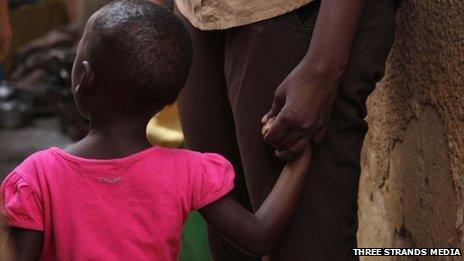Adoption from Africa: Concern over 'dramatic rise'
- Published

There is concern some children adopted from Africa have at least one living parent
The number of children from Africa being adopted by foreign nationals from other continents has risen dramatically, a report has said.
In the past eight years, international adoptions increased by almost 400%, the African Child Policy Forum has found.
"Africa is becoming the new frontier for inter-country adoption," the Addis Ababa-based group said.
But many African countries do not have adequate safeguards in place to protect the children being adopted, it warns.
The majority of so-called orphans adopted from Africa have at least one living parent and many children are trafficked or sold by their parents, the child expert group says.
More than 41,000 African children have been adopted and taken out of home countries since 2004, the ACPF report says.
More than two thirds of the total in 2009 and 2010 were adopted from Ethiopia, which now sends more children abroad for adoption than any other country, apart from China.
Adoptable children shortage
"Compromising children's best interests while undertaking inter-country adoption is likely and adoption can become a vast, profit-driven, industry with children as the commodity," the African Child Policy Forum report said.
The group's director, David Mugawe, said that adoption in some parts of Africa had indeed become a business.
"It's got an element where adoption has now become commercialised. And so it's an industry that some orphanages are benefiting [from] - and they are promoting adoption basically to be able to sustain and maintain the orphanages," he told the BBC's Focus on Africa programme.
He said large sums of money were sometimes being paid by prospective parents.
"There was a lady who worked with the American embassy in Uganda and she mentioned the figures ranged between $10,000 to $30,000," Mr Mugawe said.
According to the ACPF, Ethiopia has more than 70 adoption agencies, including 15 that only refer children to families in the United States.
Most African children go to the US, which is where most adoptions from foreign countries occur - in 2010 more than 11,000 children from more than 100 countries were adopted by American parents.
Families in western Europe and Canada also adopt African children.
International adoption is also popular in Nigeria, the Democratic Republic of Congo, South Africa, Mali, Ghana, Ivory Coast, Morocco, Uganda, and Burkina Faso, the ACPF report says.
People wanting to adopt children are increasingly turning to Africa because changes in adoption patterns and laws in other countries has resulted in a shortage of adoptable children, it says.
Countries including China, South Korea, Guatemala, Russia, Romania and Ukraine have tightened up eligibility rules and shut down or limited overseas adoption - instead promoting domestic adoption.
According to international law, inter-country adoption should be a last resort - and the rise in the number of children being adopted in Africa and moved to other countries is of concern to child welfare experts.
"Every child has the right to be reared in the country and culture in which it was born," said Mr Mugawe.
"It is true that a number of children have actually benefited from adoption, but is it the best option or have other options been explored," he told the BBC.
The report warned that many countries on the continent do not have strong enough laws and policies to stem illicit activities including child trafficking.
Only 13 African countries have ratified the Hague Convention, which provides various safeguards to try to ensure children are not adopted illegally.
"The onus is on African states to take urgent and decisive measures to strengthen families and communities to take care of children in their country of origin," the ACPF report says.
- Published16 August 2010
- Published19 February 2011